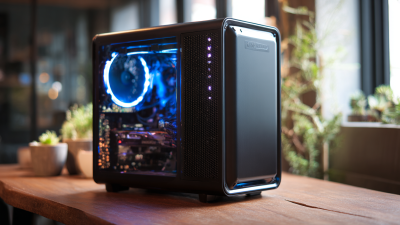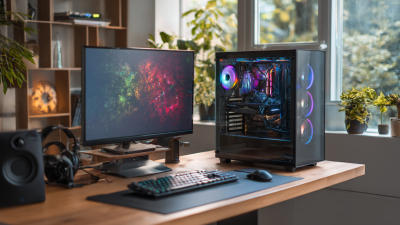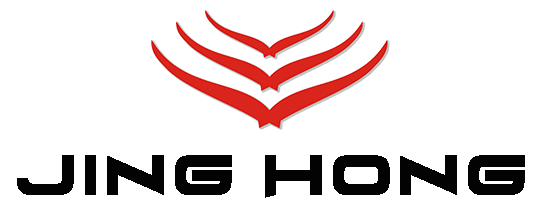One-stop service of R&D, production and sales for 10 years
Leave Your Message
In today's fast-paced business environment, companies are constantly seeking innovative solutions to enhance productivity and streamline operations. The rise of Compact PCs has been a game changer, offering powerful computing capabilities in a space-saving design. According to a recent report by IDC, the global market for compact PCs is expected to grow by 15% annually, driven by the increasing demand for flexible workspaces and efficient technology solutions. Compact PCs not only maximize desk space but also provide businesses with enhanced performance and energy efficiency, as outlined in a study from Gartner, which indicates that these devices consume up to 60% less power than traditional desktops. As organizations prioritize adaptability and sustainability, embracing Compact PCs becomes not just an option but a strategic move towards achieving modern business objectives.

In the ever-evolving landscape of modern business, compact PCs are emerging as a game-changer for enhancing efficiency. These sleek machines are designed to save valuable desk space while delivering robust performance needed for a variety of applications. As companies increasingly adopt hybrid working models, the demand for portable and versatile computing solutions has skyrocketed. Compact PCs, with their ability to handle both simple web tasks and demanding software requirements, are positioning themselves as the preferred choice for both employees on the go and those stationed in the office.
Furthermore, advancements in technology have made these mini PCs more powerful than ever. They often come equipped with the latest processors and graphics capabilities, allowing businesses to tackle tasks ranging from data analysis to graphic design without the bulk of traditional desktop setups. The integration of AI and improved computing capabilities in these compact units not only streamlines operations but also paves the way for innovative solutions across various sectors. With their blend of performance, space efficiency, and modern design, compact PCs are undoubtedly shaping the future of business efficiency in a dynamic marketplace.

The modern workplace is evolving, with a growing emphasis on maximizing efficiency and organization. One of the most significant advancements aiding this transformation is the compact PC. According to a recent study by the International Data Corporation (IDC), businesses that implement compact PCs can save up to 30% more desk space compared to traditional tower computers. This maximized space not only improves workplace aesthetics but also enhances employee productivity by allowing for a more organized and accessible work environment.
Moreover, compact PCs contribute to streamlined workflows. A report from Gartner highlights that the adoption of compact computing solutions can lead to a 15% reduction in time spent managing physical workspace, as these devices facilitate easier cable management and reduce the clutter that often hampers workflow. By creating a less distracting environment, employees can focus more effectively on their tasks, ultimately driving better outcomes for the organization. In a time when every square foot counts, compact PCs are proving to be a game-changer for companies looking to optimize their office layouts.
The rising trend of utilizing compact PCs in modern business operations can be largely attributed to their cost-effectiveness. According to a report by Gartner, businesses can reduce their total cost of ownership (TCO) by up to 30% when opting for compact PCs over traditional desktop systems. This impressive reduction is primarily due to the lower energy consumption, smaller physical footprint, and decreased maintenance costs associated with these devices. Compact PCs typically consume less power compared to standard computers, leading to significant savings on electricity bills, which can be particularly beneficial for companies aiming to lower their operational costs.
Additionally, the initial investment in compact PCs is often lower. A study by IDC suggests that small and medium-sized enterprises (SMEs) can save over 15% on hardware purchases by transitioning to compact PC solutions. This cost saving is essential for SMEs that operate on tighter budgets, allowing them to allocate more resources towards growth and innovation. The scalability and modularity of compact PCs further enhance their appeal, as businesses can easily upgrade components without incurring significant costs, ensuring that their investment remains viable in an ever-evolving technological landscape.
| Aspect | Compact PCs | Traditional PCs |
|---|---|---|
| Initial Cost | Lower | Higher |
| Energy Consumption | Less | More |
| Space Utilization | Compact | Bulky |
| Maintenance Cost | Lower | Higher |
| Upgrade Flexibility | Moderate | High |
| Noise Level | Quieter | Louder |
| Portability | High | Low |
Compact PCs have emerged as a versatile solution for modern business needs, blending performance and efficiency in a small form factor. These miniature powerhouses can support a range of applications, making them ideal for diverse work environments—from bustling offices to remote workspaces. With their ability to handle demanding software without compromising on speed, compact PCs cater to professionals seeking both portability and performance.

When choosing the right compact PC for your business, consider these tips: first, evaluate the specific requirements of your tasks. For instance, if you or your team members are involved in graphics-intensive work or coding, prioritize models with elevated processing power and memory. Secondly, assess connectivity options; ensure the PC can seamlessly integrate into your existing setup with ample ports for peripherals and networking. Lastly, look for scalable solutions that can evolve with your business needs, allowing you to upgrade hardware as technology advances.
As companies increasingly adopt flexible work models, incorporating compact PCs into the workplace can drive productivity and collaboration. Innovative designs that support modular customization not only enhance functionality but also provide a tailored experience for users, be they gamers, engineers, or business professionals.
Compact PCs have emerged as a pivotal choice for businesses aiming to enhance their sustainability efforts. According to a report by IDC, IT equipment accounts for approximately 2% of global greenhouse gas emissions, prompting a shift towards eco-friendly solutions. Compact PCs not only reduce energy consumption but also often come with a smaller carbon footprint compared to traditional desktop systems. Their efficient design helps in utilizing lower-power components, leading to energy savings of up to 50%, as highlighted by a study from the Green Electronics Council.
Moreover, many manufacturers are committing to sustainable practices by integrating recyclable materials into the design of compact PCs. For instance, a survey by Gartner indicates that 70% of businesses are actively seeking out devices that feature elements like recycled plastics and energy-efficient certifications. This trend not only resonates with the growing consumer preference for environmentally responsible products but also supports corporate initiatives aimed at reducing waste and minimizing resource consumption. By choosing compact PCs, businesses not only bolster their operational efficiency but also contribute to a more sustainable technological landscape.






